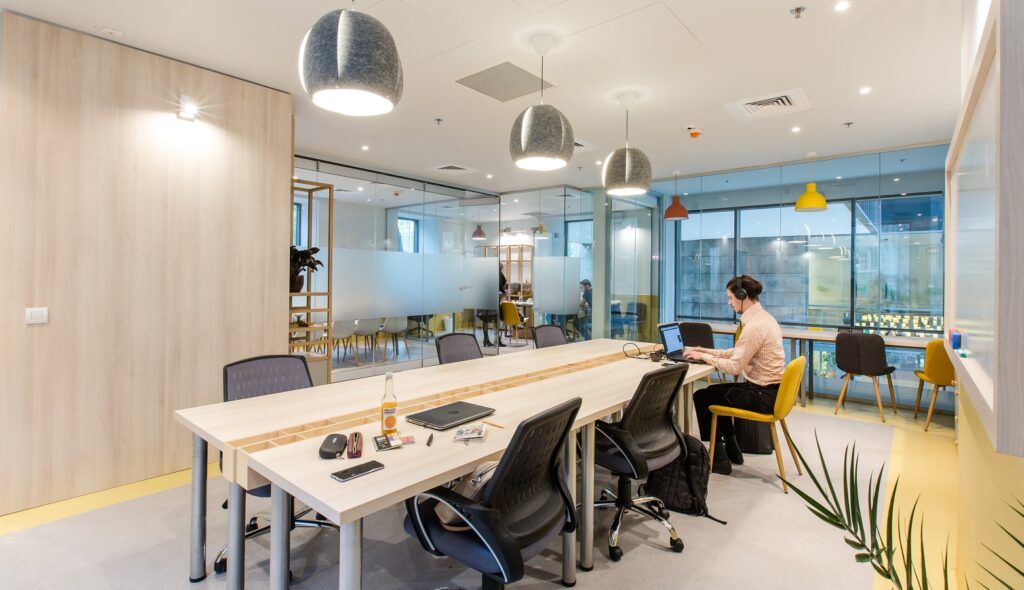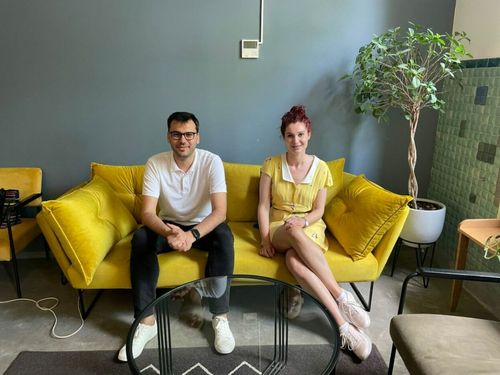
Elena Dionisie, Managing Partner at WeDoHR: It’s The Small Companies With Smart Leadership That Actually Manage To Do Extraordinary Things For Their Employees. It’s All About The People
04 December, 2023
Share this article
Elena Dionisie says she started working in HR through a series of unexpected circumstances: she studied Law, but after graduation she began working in human resources. „Sometimes things just happen and this ends up being your destiny, and I don’t mean only professionally” she told me in a frank and matter-of-fact manner during the discussion we had about the challenges and opportunities in the HR market in times of pandemic.
She began working in the field in January 2004, for Ringier România, a media company. In April 2007 she became the HR Manager of PubliMedia press group and sicne 2010 she has been in charge of all HR operations within the Mediafax Group.
She was at the top during the heydays of the Romanian press, taking on her shoulders the responsibility of constantly designing strategies for the future. Which is what gave her the courage to start on her own: in 2015 she created WeDoHR. Looking back, Elena believes that the transition towards being an entrepreneur is „the best thing that can happen to you”.
Today, WeDoHR offers full human resources management services covering several HR areas, from headhunting for extremely niched positions to organizational diagnosis for clients with high personnel turnover.
Drawing on her experience of working with both large enterprises with thousands of employees and small, boutique-sized companies, Elena shared her vision on the evolution of HR strategies as a consequence of the difficult market conditions brought on by the pandemic.
Elena, you have been working in HR since 2004, so you had the chance to experience first-hand the evolution of the HR market in Romania. What is your informed diagnosis regarding a profession that has had to learn and assimilate a lot of things on the go?
The evolution of the HR departments is directly related to the evolution of the companies and that of the industries. In the case of the large corporations, the HR activity is governed by policies and procedures, therefore the work has become more specialized, leading to a split into different ”compartments”: from benefits and compensation, to employer branding, to learning and development.
In this type of organization, HR has come to mean a lot of things. But there are also small companies, from the entrepreneurship area, where I was surprised to discover managers who put a lot of emphasis on motivating their colleagues, on increasing the level of employee involvement and satisfaction. So there is no such thing as one size fits all.
If with the large companies you have to stick to clearly defined policies and procedures, and therefore you have little chance of changing things, with small companies great things can happen, things that reveal their value on the long term and which are possible because there is spontaneity and a desire to innovate.
We have a lot of clients that are small companies and that are doing excellent things for their colleagues without necessarily having very well-defined procedures. Actually, the HR policy within any company is very much dependent on the managerial team.
In HR, you have to constantly try new things, you have to innovate, to test new strategies according to the feedback received from employees, you have to adjust your actions to the needs they express and not toss out benefits as a robot just because it’s what has been decided at company level.
Obviously, when we are talking about companies with thousands of employees, there has to be rigor and procedures in place. And let me be clear about it: I am a very strong believer in structures and in following the rules, I’m not a supporter of the no rules system. But I would rather encourage managers to manifest flexibility and openness towards their employees.
Also, I’ve always considered that the most important aspect of leadership is COMMUNICATION: the way a manager communicates with their employees, how they assign the tasks and how they give constructive feedback.
Equally important is to encourage your colleagues to collaborate and to come up with new ideas, and not be afraid to come forward with their opinions. Errors are part of the game, including the business game, but it’s better to encourage people to take the initiative (and risk being wrong) than having them stay quiet for fear of making a mistake.
After all these years, what keeps you still passionate about working in HR, and what motivates you to keep doing it?
THE PEOPLE. Also, what motivates me most is finding solutions, making things work. As an HR specialist, if people are not happy you have to try to do something to solve the problem: you have to talk to the manager, but you have to do it in such a way that the person who raised the problem does not take the blame.
You have to work out a compromise solution so that things start moving in the right direction and all parties are happy with the result. I never took sides: nor with the employer, neither with the employee.
Sometimes employees forget that they work for a business that has to function, and that means that sometimes restructuring the business is the only way to keep it afloat. You save 300 jobs, but you have to sacrifice 20. It’s important that the message is communicated in a clear, unequivocal manner so that people understand it.
„In Romania, HR means doing payrolls and not much more”. Is this a preconception, or is it a reality?
To start with, the task of doing the payrolls is very much undervalued. Actually, there are so many controversies and discussions regarding the salaries that it takes a very good HR specialist to deal with all that.
Payroll is only a small part of the activity of HR departments, most of their tasks have to do with contracts, documents, and other types of documentation. Payroll comes to the fore because it’s something that is more concrete than, say, employer branding, whose evolution can only be appreciated in the long run.
You cannot see the evolution of the employer brand from one month to the other, but salaries are paid every month.
What is the big change in the employer/employee relationship that was brought upon by the pandemic?
Since the beginning of the pandemic until now, what I have noticed is that employers need to understand that they have to be a lot more flexible and allow people to work remotely or come up with hybrid work systems.
I think that companies will lose a lot of candidates if they insist on maintaining the work from office policy. It’s something that we’ve seen over and over again during the interviews we conducted at WeDoHR: the first question that candidates ask is „WHAT IS THE WORK SYSTEM?”
 V7 Startup Studio, coworking space in Bucharest
V7 Startup Studio, coworking space in Bucharest
It’s clear that employees are no longer willing to come to the office day in and day out. As an employer, you have to know your target audience on the workforce market and your mission and values have to be communicated in accordance to the type of candidates you want to attract in your company.
So, from your point of view, the office employees will no longer go back to the „old normal”.
Taking into account the feedback received during the interviews we conducted, I don’t think that kind of normality is possible anymore. As an exception, we did find people who insisted on coming to the physical office, but it was more related to a lack of appropriate space in their homes.
Other than that, all the candidates we talk to now want the freedom to organize their timetable and not lose precious time stuck in traffic. The good news is that a lot of our clients – companies – have been extremely prompt and have quickly adopted the remote work style.
Overnight, they were able to find solutions to adapt to the work from home style, and I’m talking about companies that are literally working around the clock.
For example, co-working spaces are a solution that has the benefit of allowing social contact, but in case you choose them, you have to make sure that they have all the facilities in place, from meeting rooms to the internet connection.
How has the recruitment strategy changed with the pandemic?
The recruitment strategy changed because once again we had to adapt to the new circumstances. Before the pandemic, if you had asked me what I think about online interviews, I would have answered that I find doing online interviews very difficult.
And I still think that live, face to face interviews are the real thing, but at the same time I have to admit that it’s a lot more efficient to have a first discussion online. After a first, introductory meeting, it’s a lot easier for both company and candidate to set their expectations.
Ideally, the second stage of the recruitment process should include a live, face to face meeting. In my opinion and that of many companies, this is the winning recipe. The pandemic helped us all to be more efficient, including in the recruitment process because, for example, the first meeting and the testing step have moved online.
But there are also downsides to doing online interviews: you cannot perceive all the facial expressions, all the reactions, and you have to pay a lot more attention to what the other person is trying to convey from the other side of the computer screen. Obviously, what is missing is the connection, the atmosphere you can create in an office environment – the small interaction rituals that can tell a lot about a person. When doing the interview online, you go straight to the facts.
What are your recommendations when preparing for an online interview? Do you have a list of tips & tricks, some practical advice?
As I was saying, whenever possible, the second or third interview should take place offline, face to face. But before that, it’s absolutely vital to always test and make sure that the application or platform that you will use for the interview with your future employer is actually working.
So, the first piece of advice is, before the start of the interview, make sure that everything is functional. Then, obviously, in order to avoid interruptions make sure to silence all e-mail, messaging, or phone notifications.
We tend to forget that we still have to pay attention and be respectful even if we are „only” having an online interview. Candidates should make the same preparations as if they were going to an on-site interview: dress appropriately, have a pleasant demeanor and pay attention to what is visible in their background, after all, it all has to do with your degree of involvement and the importance you give to the job interview.
But let’s move on from the job interview to the topic of remote induction – another challenge that the pandemic has thrown at the employer and implicitly at the HR department of a company.
The new employees’ induction process is in itself very important regardless of the circumstances, but the pandemic has made it even more difficult to manage, especially because now it has to be delivered remotely.
It’s the responsibility of each employer to develop mechanisms that can ensure a successful induction. On the other hand, the employers who have placed a great deal of importance on this process while it took place offline will of course pay the same attention to the online induction.
Certainly, they needed time to adapt their induction procedures, but in the end they were able to find the right solutions in order to efficiently integrate the new colleagues within the team. On the contrary, a company that did not have the induction process running smoothly before the pandemic will find it even more difficult to make it work online.
We have clients who have requested that employees come to the physical office at least a couple of days in order to facilitate the induction process, but we also have clients who found different ways to adapt the induction process to the online medium.
How do you motivate employees, and how do you keep them satisfied while working remotely?
The most important thing is to create opportunities for employees to spend time together even while working remotely and at the same time, you have to make sure they don’t feel that their personal time and space have been invaded. At the beginning of the pandemic, we organized different types of online interactions for different companies with the aim of preserving cohesion within the team.
Motivation and satisfaction stem primarily from the way you communicate with your employees, from the expectations that each party has, and also from feedback. The pandemic context will expose the actual degree of the leniency and empathy of an employer.
Employees actually tend to work longer hours when working from home, they check their e-mail more frequently even outside the working hours. What’s more, the concept of „private time” has been diluted because working from home means you no longer get to leave your work problems at the office, they are with you all the time.
Consequently, the degree to which an employee is satisfied with their job has a lot to do with their own capacity to organize and manage their personal time, with the capacity to strike a balance between work time and personal time. An employer who, before the pandemic used to send e-mails at midnight, will keep doing the same during the pandemic, but this doesn’t mean that the employee has to answer those e-mails just because they are now working from home.
What is the crucial ability that the employee of the future should have?
ADAPTABILITY. You should not be a slave to your own expectations, you should evolve with the market, regardless of whether you are an employer or an employee.
Maybe at some point you cannot find the exact set of abilities that you look for or that you want for a specific position. You will have to think how you can develop those skills and not become stuck with a rigid set of expectations.
Do you think that the role of the HR departments will become more important with the change of the work paradigm?
Frankly, yes, but I also think that it actually comes down to each company and its own management style. There will be an increased need of HR personnel who is in permanent contact with the people, who is open to talk to the employees and who is determined to find solutions in order to preserve the employee loyalty and satisfaction.
HR departments have an open door with the managerial team and therefore have to have the ability to communicate to the management in an adequate manner the expectations of the employees. They have to find a way to deliver the message so that the solution that is found is satisfactory for both sides.
 Elena Dionisie, Managing Partner at WeDoHR
Elena Dionisie, Managing Partner at WeDoHR
In your opinion, as an HR specialist, what is the biggest lesson that the pandemic taught us?
As recruiters, during the pandemic, it was a lot more difficult for us to find valuable candidates because the ones we were contacting did not feel comfortable making a change during these times of uncertainty.The lack of predictability has made recruitment more difficult. Personally, a business lesson I learned is to always be prepared for the new: be prepared to offer new services, to constantly come up with new projects, and be ready to grow in different areas so that you are able to adapt on the go to the needs of the market.
Interviews
Keep up to date with our most recent articles, events and all that Pluria has to offer you.
By subscribing to the newsletter you agree with the privacy policy.

In his famous 1970 book, Future Shock, Alvin Toffler refers to work flexibility as one of the social changes that technological progress will bring about and predicted that in the future, employees will no [...]
04 December, 2023

The pandemic has opened some doors, and we can no longer shut them back. Minio Studio is an integrated communication agency that shares greatness through agility and empathy.
“See you on Thursday!
04 December, 2023

Elena Dionisie says she started working in HR through a series of unexpected circumstances: she studied Law, but after graduation she began working in human resources. „Sometimes things just happen and[...]
04 December, 2023